László Gróf
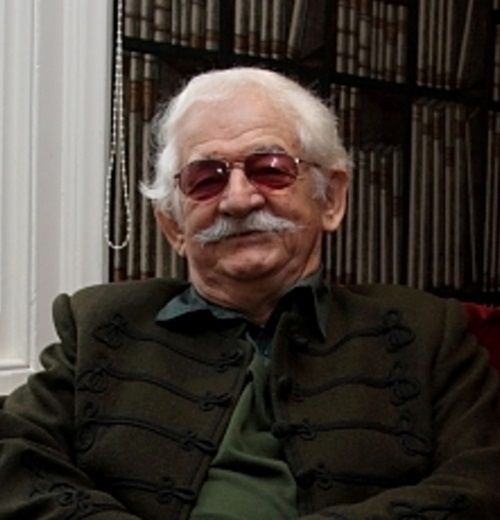
MY DAYS IN NEW TUPTON – an excerpt from my life’s story.
By László Gróf.
If in England something is called new, it still can be very old. In Oxford, for instance, the famous "New College" was founded in the 14th century by William of Wykeham, bishop of Winchester on the ruins of the 'black death'. Then it was new, and the name stuck to this day.
It was the same with New Tupton - only not Richard II, but Queen Victoria sat on the throne when this part of Tupton village was built. There were rows of "two up - two down" houses in Queen Victoria Road, where Feri Farkas lived with his wife and teenage daughter. As small as Feri was, so big was his heart. Feri's brother-in-law also lived there with his wife, and often his young sister-in-law stayed there, too.
I met Feri in Alfreton at the Miners’ Hostel, where we, Hungarian refugees arrived in November 1956 and he had been our interpreter. We stayed in Alfreton for only about two months, nevertheless, Feri and I became good friends. So, when the hostel in Alfreton closed, he asked me if I would like to come and stay with them instead of going up north to Hull. Accepting his generous offer, I found myself living in this rather crowded, but friendly household. The two upstairs bedrooms having been occupied, so the dining room became my new home and the double settee in front of the fireplace my single bed. Beside my room to one side was the lounge with a door opening direct onto the street, and to the other the kitchen and a small scullery. From the kitchen we stepped into a tiny brick-laid back yard, with a gate opening to an alley stretching behind the houses. However, there was no bathroom. The tin bath came into the house once a week and was filled with water from the kitchen boiler. One could, of course, not lay down, could only sit in it, with feet firmly outside, on the ground. Splashing was out of the question. First, before entering the bath, came washing the face and upper body, only then sitting in and bathing the more private parts, emerging finally to wash the feet with a towel round one’s waist.
Naturally, I had to find work rather quickly and with Feri’s help I found employment in the nearby iron foundry, just up the road. This occupation was rather strange to me, a qualified dairy technician, as I was back in Hungary, making butter and cheese, or here in Alfreton as an impromptu cook - but 'beggars can't be choosers'… The only advantage of this rather heavy and somewhat dangerous work – apart from the money – was that my English vocabulary had increased with some interesting swear words. I had been hardly there a fortnight, when Feri came home one evening and asked would I like to work with him at the opencast coalmine? Of course! – was my immediate answer. We not only would be working together, but the molten iron wouldn’t shoot sparkles on my neck (hence the learning of swear words) either, and on top, my wages would be still higher! We had been working together with great diligence and I managed to save up enough money to buy a brand new sport bicycle. The newly displayed Vauxhall Victor, which caught my eye in a Chesterfield showroom, had to wait as yet. In the village the only fun was the pub, a place which never appealed to me really. Therefore, on weekends I sat on my bike and cycled the area getting to know the beautiful landscape around the village. In the dark winter evenings, one frequently saw little men with a large sack filled with coal over their shoulder, collected from the many sites where the ‘black gold’ of the Midlands were stored. The police tactfully this time of the day always seemed to be busy on other duties. One Saturday, Feri's brother-in-law came up with the idea to go with him to catch rabbits. Not fully understanding, but after some figurative explanation I was hoping to see some hopping bunnies. So early next morning we started out, he picked up some nets and put the ferret under his sweater, then with a "just call me Jack" we went to a large field about a mile or two away. I thought it odd, why he suddenly changed his name to Jack, little did I realise we were in a secret mission, actually poaching rabbits, in a farmer’s field. We soon saw lots of holes that led to the rabbit warren – that is why he needed the nets. ‘Jack’ placed a net carefully over each hole and then he put the ferret into one of the openings. Nothing happened at first, but putting our ears to the ground we could hear what was happening inside. All of a sudden the rabbits came and jumped one after the other into the nets. With a quick sharp blow to the back of their neck, he put them in a sack and we started back home with our booty. The brother-in-law was happy, but I was sad, regretting waking the little bunnies so brutally from their sleep. Needless to say, I didn’t eat the Sunday rabbit stew either – nor do I like it ever since.
In the England of the 1950’s generally only the men had employment, women stayed at home and looked after the family and family chores. This is how it was with Feri. His wife Elsie cooked and baked, did the washing and ironing for the family, including myself – by now considered a family member. In the evening, however, women got dressed, put make-up on to make themselves pretty, before going to the pub, an historically important place in the life of the local community. It is here, that in past centuries they would discuss the villagers’ problems with the lord of the manor, and it is here where couples still go now to enjoy themselves, have games and a chat, as opposed to Hungary, where only men goes to a ‘kocsma’ (pub). Elsie was a lovely lady, but terribly jealous. On one occasion we picked some bluebells in the woods next to the opencast coalmine which Feri tied in a bunch and took it home. It caused such an uproar and argument, it was a waste of time trying to explain that it was for her. I learnt later, that she had turned her jealousy into alcohol, such a tragedy, as Feri really loved her. In the meantime I was considering finding lodgings somewhere and with Feri’s help I have managed to find one in the leafy Hasland district of nearby town Chesterfield.
During the middle of the 1960's with my wife I drove up to Chesterfield and visited Feri. Unfortunately, it was a sad event, as Elsie was taken to hospital with severe burns. As it happened, she had fallen asleep in a friend’s caravan with a burning cigarette and it caught fire. Poor Feri, amidst his great concern, apologised and also asked me not to go to Chesterfield’s main square, because he was working there on a house demolition and didn’t want my wife to see him as a ‘proli’ (i.e. labouring proletary man).
“I can only be proud of you Feri” – this lovely man of New Tupton, who with his family was prepared to share their everything with me. I think back with grateful gratitude, but how can one ever repay this immense generosity?
NB. On the last day of January 2009 I found on the Ancestry.co.uk website that Elsie died in 1990, and Feri in 1995. God rest them both in peace! … and now, on 6th October 2018 I received news from Melvin Cooper via Tupton Pictures website, that their only daughter Carol [Rumble] passed away in 2014.
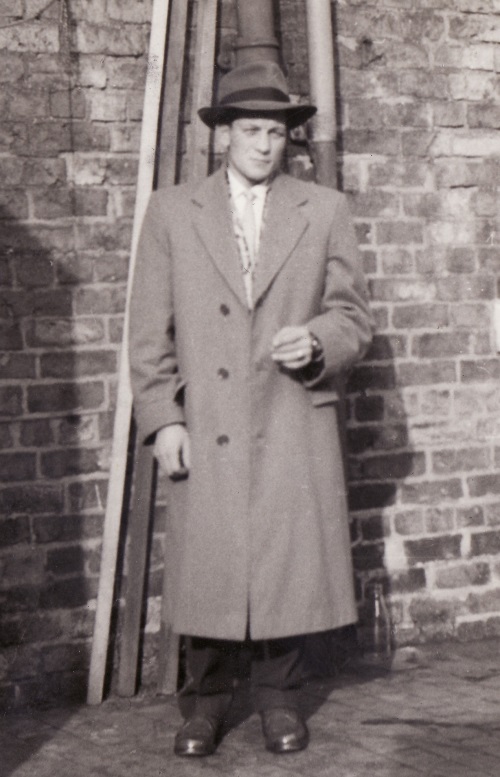
Frederick (Feri) Farkas. Born in the Kispest district of Budapest. Taken in 1957 at the back of the terraced houses (now sadly demolished) in Queen Victoria Road
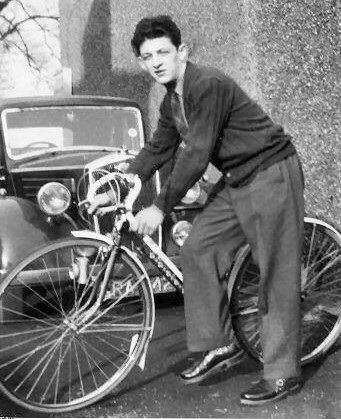
László Gróf. (Taken at Queen Victoria Road,1957)
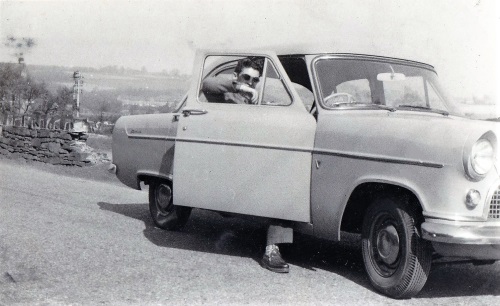
László Gróf. Taken in Spring 1957 Queen Victoria Road where the shop ( now demolished) was.
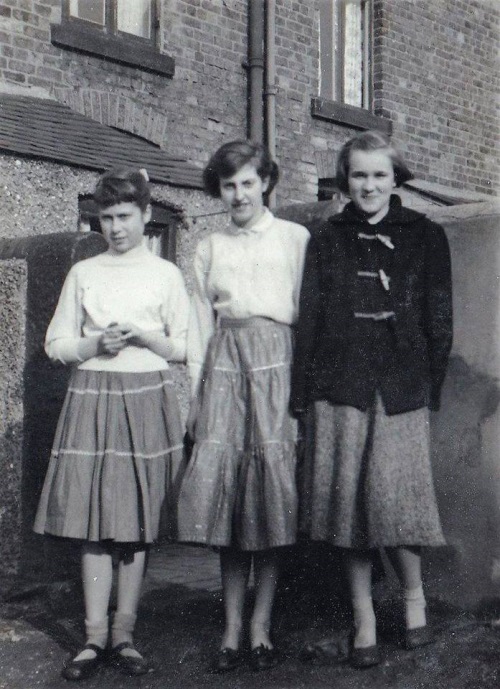
Carol Rumble (on the right), daughter of Feri and Elsie Farkas. (Taken at Queen Victoria Road, 1957)
Thanks to László Gróf.